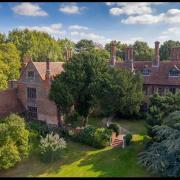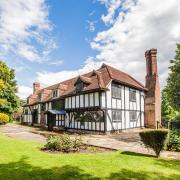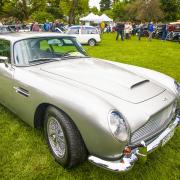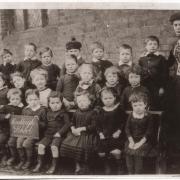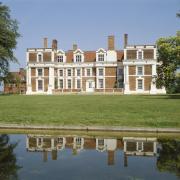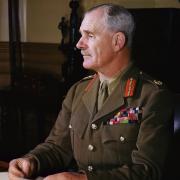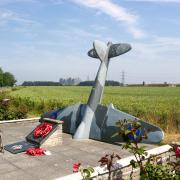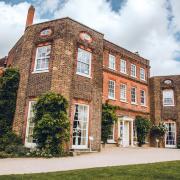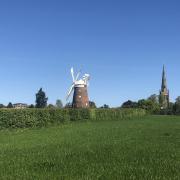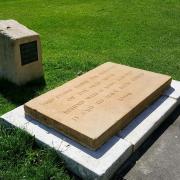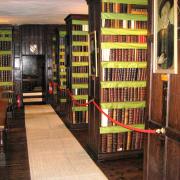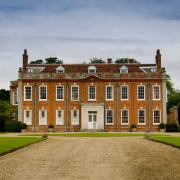We’re celebrating 70 years of Essex Life by looking back on the historic events and famous folk that have shaped the county since our launch in 1952. This month, we go back to the eighties
Words: Stephen Roberts
I lived and taught in Southend in the early 1980s, and I witnessed the seismic changes taking place. It was the decade of Thatcherism and deregulation, privatisation, share ownership and the Right to Buy act, yuppies and individual aspiration, as well as the first flowering of Essex Man and Essex Girl.

On the world stage
The decade’s early years saw the wedding of Prince Charles and Diana Spencer (1981) and the UK at war over the Falkland Islands (1982), but globally it was the era of Reagan and Gorbachev, which ultimately led via Glasnost and Perestroika reforms to the ending of the Cold War and tumbling of the Berlin Wall in 1989. Sadly, as I write in spring 2022, the Cold War no longer seems but a memory.
There were plenty of grim headlines as the eighties unfolded: the UK miners’ strike of 1984-85, the potential danger of nuclear power writ large by the Chernobyl disaster (1986) and the threat of terrorism as Pan Am flight 103 blew up over Lockerbie (1988).
Political landscape
The eighties saw two stunning victories for Margaret Thatcher in the decade’s general elections. Buoyed by the Falklands victory, the Conservatives romped home with a majority of 144 in 1983, then did almost as well in 1987, winning with a majority of 102.
‘Essex Man’ explained these Thatcher victories as he bought into the meritocracy that was being talked up. Essex was an almost total blue-out, with just one Labour MP elected in 1983 and none in 1987. Bucking the trend was Oonagh McDonald in Thurrock, who held her seat in ’83 but lost out four years later to Timothy Janman as Essex went 100 per cent Tory, the party winning all the county’s 16 seats.

It was an Essex MP, Norman Tebbit, who made perhaps the most famous meritocracy speech of the era at the Tory Party conference of 1981, when he reminisced about his dad leaping on his bike and pedalling off looking for work. Tebbit was the MP for Chingford when he made the speech. Thatcher became a victim of her own meritocracy, ousted by her own party come 1990.
There were two by-elections in Essex during the eighties. The Southend East by-election (March 1980) saw Teddy Taylor narrowly retain the seat for the Conservatives by just 430 votes over the Labour candidate, Colin George. The December 1988 Epping Forest by-election saw no such excitement with Steven Norris easily retaining the seat for the Conservatives over a divided opposition: The Social Democrats (1981-88) had recently merged with the Liberals to form today’s Liberal Democrats, but the rump SDP still fielded its own candidate in Epping Forest.
A time of change
The Right to Buy (one’s council house) was a major Thatcher initiative that launched in Essex at 39 Amersham Road, Harold Hill, Romford. The ‘Iron Lady’ was photographed with the Patterson family, the first people in the UK to purchase their council house under the scheme. Their estate was built by London County Council in the 1950s, and the Pattersons moved in in 1962, before symbolically receiving their keys from Maggie in August 1980 (although they already had them, to be fair).
Mrs T stayed for tea before presumably heading back to Westminster to handbag someone. The Pattersons bought their council house for £8,315 with a deposit of a fiver; the house had several later owners and reportedly sold for £183,000 in 2007. The scheme divided opinion. Barking and Dagenham lost 48,500 council units whilst home ownership in Basildon soared from 53 per cent in 1981 to 71 per cent 15 years later.
In the ’80s we saw the deregulation of the City (aka the Big Bang) in 1986, as well as the invention of the World Wide Web in 1989. The man who created it, Tim Berners-Lee, would be made an honorary graduate of the University of Essex in 1998. It was the start of tech as we know it.

Locally, there were changes afoot. The Dartford Crossing’s East Tunnel was opened in 1980 (the West Tunnel opened in 1963), while the new ‘community’ of South Woodham Ferrers was officially opened by HM Queen Elizabeth II in 1981. The Essex Act of 1987 came along, its most notable clause prohibited parking on grass verges (quite right), and the major £100 million redevelopment of Stansted Airport took off in 1988.
Essex in pop culture
It was the era of the yuppie. Brash and upwardly mobile, we’d see ‘Del Boys’ with mobile phones the size of bricks (the first mobile was developed in 1973 but became commercially available from 1983). Pop music was changing too, with the launch of MTV in 1981 seeing acts become just as famous for videos as for music. Hip hop became popular from the early-80s, whilst Live Aid (1985) struck a chord as the Ethiopian famine (1983-85) hit TV screens.
‘Essex Girl’ joined ‘Essex Man’ as an icon during the ’80s, with Birds of a Feather first broadcast in October 1989. Set in Chigwell, it introduced us to the double-act of Sharon and Tracey, names already adopted by a popular newspaper column from 1986, written by Keith Waterhouse.

Miss Essex pageants were popular in the eighties, as were polarising shoulder pads, a feature of Dallas, which first aired in 1978 and entertained us throughout the 1980s. If none of that rocked your boat, you might have been fiddling with a Rubik’s Cube, invented by Hungarian Ernö Rubik in 1974, but licenced for sale in 1980. Everyone had one.
On the screen, The Woman in Black (1989), dubbed Britain’s ‘scariest horror movie’, was part-filmed at Osea Island’s causeway and local salt marshes. A later version in 2012 would see Harry Potter star Daniel Radcliffe in the lead role.
White Gold was a more recent TV series (2017-19), a sitcom based around the exploits of window salesmen employed by Cachet Windows in Corringham and set back in the mid-1980s. Starring two ex-Inbetweeners actors, it’s worth checking out for some nostalgia.
Very sporting
This was Essex’s decade as it won the County Cricket Championship three times in four seasons (1983, 1984 and 1986). A halcyon period also saw a plethora of one-day honours: The 1985 NatWest Trophy (60-over knockout cup), a trio of Sunday League titles (1981, 1984 and 1985) and the Refuge Assurance Cup of 1989 (for the four best teams in the Sunday League). Thwack.
It was hard for local footie to compete but Southend United tried, twice clinching promotion from Division 4, including as champions in 1980-81, whilst Dagenham won the FA Trophy (1980) and Stansted the FA Vase (1984), both finals contested at the old Wembley Stadium.
The 1984 Los Angeles Olympics saw a trio of Essex medallists. David Ottley (born West Thurrock, 1955) won Javelin silver, whilst Robert Cattrall (born Braintree, 1957) was a member of the Men’s Field Hockey squad that won bronze. Pride of place went to schoolgirl Sarah Hardcastle (born Chelmsford, 1969) who returned with two swimming medals, silver in the 400 metres freestyle and bronze in the 800 free.
I can claim to have stood on the terrace at Roots Hall watching Southend United in its championship season and to have seen young Sarah excel at a swimming meet. I was also present when Southend Rugby Football Club took on the might of Gloucester RFC in the John Player Cup 3rd Round (last 32) in the 1980-81 season. I recall the Southend lads plodding on to the field and being dwarfed by the Gloucester heavyweights thumping on like a crash of rhinos. The Essex side did well to only lose 6-12.

Famous comings and goings
Among the famous (or famous-to-be) arrivals in the eighties were 2009 X Factor runner-up Olly Murs (born Witham, 1984) and Stacey Solomon (born Dagenham, 1989) who finished third in the same series. Rachel Riley, the TV presenter and co-presenter of Countdown, was born in Rochford in 1986, whilst Chloe Rogers (born Harlow, 1985) won an Olympic bronze in Women’s Field Hockey at the 2012 London Games.

Of the Eighties departures perhaps the most famous was Alfred Hitchcock (1899-1980). Born in Leytonstone, he went on to direct more than 50 films, earning the moniker the ‘Master of Suspense’. He was nominated five times for the Best Director Oscar at the Academy Awards without winning, although the movies he directed garnered a grand total of 50 Oscars, including Rebecca (1940), which won Best Film.
You may also like...
Essex in the 1970s: https://www.greatbritishlife.co.uk/lifestyle/heritage/essex-in-the-1970s-9142166
Essex in the 1960s: https://www.greatbritishlife.co.uk/lifestyle/heritage/essex-in-the-1950s-9036384
Essex in the 1950s: https://www.greatbritishlife.co.uk/lifestyle/heritage/history-of-essex-in-the-1950s-8949858



